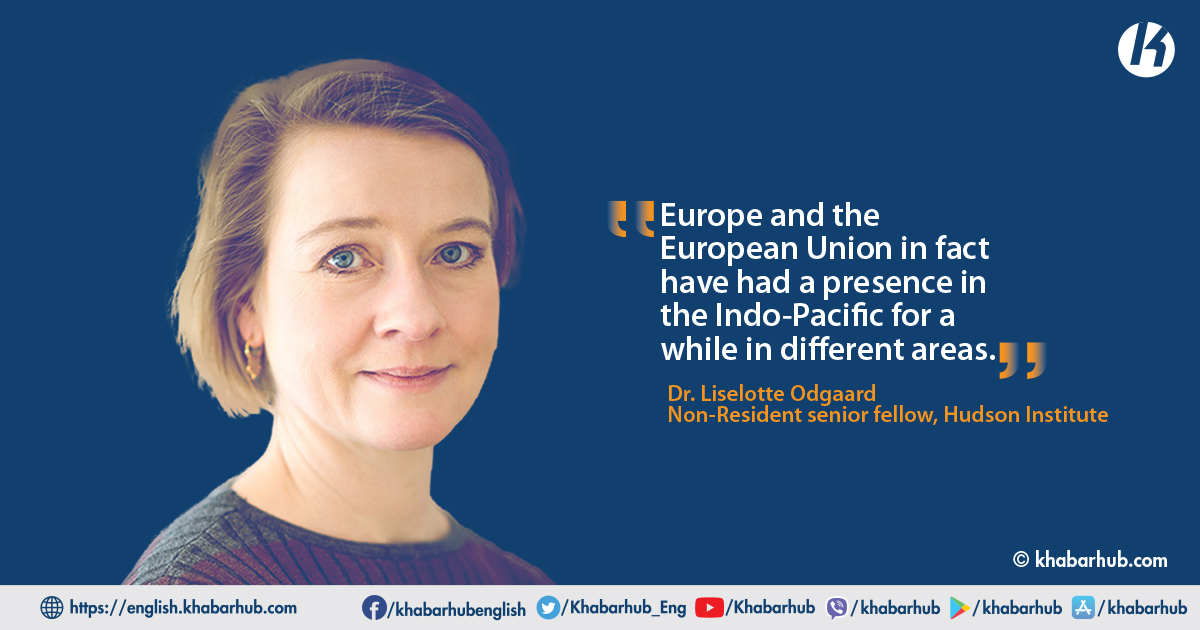Dr. Liselotte Odgaard is a Non-Resident senior fellow at Hudson Institute and senior fellow at the Norwegian Institute for Defense Studies.
She has been a visiting scholar at institutions such as Harvard University, the Wilson Center, and the Norwegian Nobel Institute. She is the author of numerous monographs, books, peer-reviewed articles, and research papers on Chinese and Indo-Pacific security, and she is a frequent commentator on these issues in the media.
Dr. Odgaard’s recent publications include “European Engagement in the Indo-Pacific: The Interplay between Institutional and State-Level Naval Diplomacy,” Asia Policy, 14:4, October 2019, pp.129-59 and “Europe’s Place in Sino-U.S. Competition,” in Ashley J. Tellis, Alison Szalwinski, and Michael Willis (eds.), Strategic Asia 2020: Sino-U.S. Competition for Global Influence, Seattle: NBR, 2020, pp. 277-304.
Dr. Pramod Jaiswal, Strategic Affairs Editor at Khabarhub, spoke to Dr. Liselotte Odgaard on the issues related to Europe’s Role in the Indo-Pacific with Dr. Odgaard.
The European Union has finally put together a long-awaited strategy on the Indo-Pacific. What are the reasons for the EU to step into the region and what are the major goals of this strategy?
Europe and the European Union in fact have had a presence in the Indo-Pacific for a while in different areas. The main strength of the EU is its trade, its power over trade where it has a lot of decision-making power in relation to its member states.
And it has had free trade agreements and pursued more free trade agreements for a couple of years. And so in an economic sense, the EU is already a significant actor in the Indo-Pacific.
Security-wise it’s much more difficult for the EU to establish its footprint because it has less power over the member states.
Because there are all these areas where the EU cannot take decisions on its own, today it often works in this way.
A number of countries that want to move forward with some policy areas like playing security, military role in the Indo-Pacific will move forward and of course, there will be informal discussions within the European institutions about this and to do such a thing the main powers will usually have to be a part of it.
So, in the case of naval diplomacy in the Indo-Pacific, France took the lead together with the then member of the EU, the UK, in establishing a military footprint in the Indo-Pacific.
And that has slowly been built up and now countries like Germany and the Netherlands also form part of the effort.
And this is where the EU publishes a strategy endorsing and recognizing that this is important and the EU will establish mechanisms in support of this effort on the part of individual member states. And that’s also what it says in the strategy.
If you read it, for example, the EU has a counter-piracy naval force that’s called “Operation Atlanta” and it plans to organize more joint exercises and port calls between Indo-Pacific naval units and this naval force.
And it will also encourage increased participation of partners in the EU military and civilian common security and defense missions.
And it will aim to expand its security and defense dialogues to include more partners and engage more strongly with the ASEAN regional forum etc.
So the EU in various ways will be supportive of the efforts of individual countries and that’s significant in the areas of trade.
The EU has announced it will have relations with the QUAD countries which is an important security grouping on subjects of common interests such as technology, vaccines, climate change, areas where the EU is an important actor globally as well.
So, in this way, it is very significant and it’s been a long time coming, it’s a process that has developed since 2014 clearly and is coming to a new stage now.
Does this new strategy signal a seismic shift from an older understanding of the Asia-Pacific to the evolving doctrine of the Indo-Pacific? And what repercussions will it have on the Indo-Pacific policymakers?
I don’t think it’s a seismic shift because as I just described it’s been a gradual process. The seismic shift for the EU has been a couple, of course, there is Brexit.
Brexit for the EU member states, even if they have disagreements they understand they have to act together to have a European influence in an era of US-China competition.
It is necessary for the countries to act together despite their differences and so no country wants to go down the route of the UK, not even those that are quite difficult in the media and the public, for example-Hungary, challenging the EU doesn’t mean they want to leave.
No country wants to leave because they understand that they need the union to exercise the influence. So that’s the seismic shift and that’s also why the EU operates in a different way today.
For some countries, starting an effort based on negotiations between the countries and the EU brings the countries together in the councils and other places.
So now they can coordinate what they’re doing. And then, the EU will plan to establish mechanisms that support these efforts and they will be launched once it goes off the ground and major countries are on board, such as Germany which took a while to become part of that effort.
It’s a big thing for Germany to send a warship to the Indo-Pacific and even if it doesn’t change the actual situation on the ground but is the signal that Europe has a presence, that they have a view on what goes on in South China Sea that they’re willing to pursue is important.
And that’s not EU policy because there you only have these general policy statements because some countries don’t want to make a big move in the Indo-Pacific but still this is very much seen as a European effort once the major countries are on board and that’s significant. But it’s been a gradual process.

Did the Biden Administration really fail to consult its allies over the withdrawal from Afghanistan? Do you think the growing argument on creating a new, separate European Union military force is necessary after what happened in Afghanistan?
Afghanistan is important for the regional situation. But I don’t think it will tell us much about EU-US relations and the states within NATO because NATO and its member states recognize that there are other issues that they need to pay attention to militarily.
Even if there is a lot of criticism about the way in which the US withdrew, it didn’t listen to their allies, etc. I don’t think it will be a key issue for the alliance.
There are other more important issues in their view that will affect it. The Chinese and the Russian challenges to the US and Europe are considered the main issues on the agenda.
And the withdrawal from Afghanistan is to redirect resources towards addressing those challenges.
So I don’t think there was much disagreement about that move so I don’t think it will say much about whether Europe and the US can cooperate and whether they can do it in a way that provides credible returns against Russia and China.
As Russia and Belarus formally opened a week-long vast joint military drill across the territory of both countries and in the Baltic Sea, how have the NATO countries been responding to this development especially at a time of heightened tensions between the West and Belarus due to a crackdown on the opposition?
This is a major concern for Europe and for the US. But there is this issue that for the United States, China is threat number one and Russia may be threat number two, whereas, for Europe, the hard power use of Russia is a threat number one and China is threat number two.
So there is a geographical difference between their security and military priorities and that hasn’t yet been a problem on the ground in NATO because the US contributes as much as it always has.
Especially if you count US contributions to bilateral NATO projects then it’s as active as ever in Eastern Europe. But down the road, the US will most likely be directing most of its resources to the Indo-Pacific and then some voices argue that Europe should have more of a role in deterring Russia and in taking on that challenge.
It remains to be seen if that actually happens because the downside to that is, Europe and the US will start disintegrating their structures and their capabilities and potentially I’m not sure that’s desirable for NATO.
So, while that’s on the table it may not come to play out in that way because it has disadvantages also to have different priorities in terms of deterrence.
How has China’s opacity in nuclear policy and its nuclear ambiguity affected the strategic landscape in the region?
China is becoming a nuclear or seen as a threat with regard to its nuclear poster, with regard to Taiwan it is becoming a threat in that field also.
We have already seen the US responding to that in terms of its strategy, its acquisition plans, its plans for deployments, etc. but I don’t think Europe is prepared to go down that route yet as it’s also not been entirely happy with all of the US responses.
It has been a cause of debate as to what the response to this should be and I don’t think that debate is finished yet. So again, I would say the US is pretty clear on making that a major issue of its strategy and deployment.
But in the case of Europe, I think their response will take longer to come for that, and it may be one of the areas where the US will play a role but individual European countries will play less if not any.
Couple of months back China had imposed sanctions on European NGOs, academicians and think tanks, including several members of the European Parliament. Considering these developments, do you think that China is losing Europe? Has Beijing failed in crafting its European policy?
Well, it had quite severe consequences. Prior to this Chinese action, Europe and China had agreed on this comprehensive bilateral investment treaty and that was seen as a victory for China in the sense that they wanted to demonstrate that they could forge agreements with Western countries where they took into account their concerns.
And for the European Union, it was going to be a test of whether China would take seriously the concerns of Europe which are shared by the US about Chinese intellectual property, huge state subsidies to companies to compete on unfair terms in the global markets and all these breaches of WTO rules that both Europe and the US are very concerned about.
Of course, because China chose to adopt these sanctions against European institutions within the European Union countries etc. that treaty was scrapped and so China’s chance to demonstrate that it would voluntarily try to compromise with western views on how to behave in the international economic and financial systems was lost.
I think that was a very unwise decision on the part of China and the treaty is not going to be revived anytime soon now and it pushed Europe closer towards the hard-line which the US has taken.
So that was an unfortunate move if China was hoping to get Europe to agree that we have to work on this in a diplomatic way and we can solve problems diplomatically and politically and we don’t have to use the heavy-handed measures that the US does etc.
That was not good. So, China would have to do something to demonstrate that Europe and the US should go down that route otherwise I think Europe too will have to rely more on defense measures that the European Union has already started to construct to defend themselves against China’s theft, etc.

What do you have to say about the competing strategic vision of China and Russia in the Arctic region? How can the long-term strategic balance in the Arctic be understood?
Well, I think Russia and China play quite different roles in the Arctic because Russia is the resident power, it’s the major Arctic nation and for that reason, it’s got lots of legitimate interest and natural role to play.
Here in Norway what has happened is that Norway has accepted much closer military relations with the United States and there is a military buildup in response to the Russian military buildup in the Arctic which cannot just be seen as Russia wanting to control the maritime areas where it has jurisdiction, etc. but it is a military buildup that is directed against the US homeland.
And Russia is constantly testing NATO’s ability to counter the military threats from Russia, that’s sort of a day-to-day thing that NATO countries and partners have to deal with in the Arctic.
Norway has responded by moving militarily much closer to the United States which will now have bases etc here in Norway, but at the same time, Norway has a lot of cooperation with Russia and neighboring states and there is a lot of interaction in the Arctic part of Norway and Russia between the countries research, education, trade and I think that’s in a way that the way things are heading.
So, while deterring Russia militarily there are also efforts to demonstrate that we still have to work with Russia and the US is also trying to go down that route.
China is not a military power in the Arctic and although it has made great efforts to have a strategic presence in the Arctic by getting a foot into controlling or exploiting natural resources, strategic resources also trying to acquire, for example, scrapped military bases it has often been prevented from doing so.
It hasn’t complained too much about that because at the end of the day the Arctic is not high on the list of priorities for China.
It works closely with Russia because a lot of the other Arctic nations are less favorable to China’s engagement, especially in later years which sort of encourages China to work much closer with Russia.
But Russia is also skeptical of China, it doesn’t want China to have a major Arctic presence and so they don’t always agree and Russia takes care to work with other nations such as France and Japan on strategic resources such as liquified natural gas.
I think they work together in the areas of common interest but there’s a limit to how far that cooperation will go and I don’t see China becoming a military power in the near future in the Arctic because they simply have too many other concerns for that to be a priority.
Now also with Afghanistan as you mentioned, they’re going to have to take that seriously, even in the military sense because it’s in their backyard and they will have to now and they will of course try to manage it primarily through economic, political and diplomatic means but they will have to also build a military capability that’s able to handle major instability in that part of the world.
So, in the big picture, China has other things to be concerned about. So militarily, I don’t see them playing any roles, they will of course explore things but that is different from playing a role militarily.









Comment